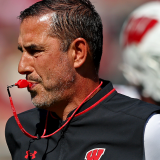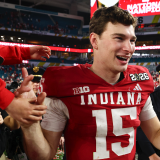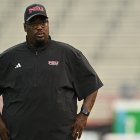Kansas State coach Bill Snyder's vindictive, petty decision speaks to a larger problem
Blocking a transfer from 35 schools is about power and absolutely nothing else

Editor's Note: At 2:31 p.m. on Friday, Corey Sutton announced that Kansas State has reversed course and granted him a full release from the school. The Wildcats' athletic director confirmed that there are no restrictions on where Sutton can go, and coach Bill Snyder issued an apology for the situation.
"After having further dialogue with Coach Snyder and the Sutton family, we believe that it is in everyone's best interest to grant Corey his full release," said AD Gene Taylor. "We wish Corey the best as he continues his athletic and academic career."
"I would like to apologize to Corey and his family for my remarks last night which included sensitive and private information," Snyder said in a release. "I spoke out of line and for that I express a sincere regret for my comments."
Thank you to everyone who supported me, I am now released from Kansas State University.
— 12 (@coreysutton1997) June 2, 2017
Original story
Kansas State coach Bill Snyder is merely the latest face of college sports' most restrictive, draconian and possibly illegal regulation.
The story started Tuesday with K-State backup receiver Corey Sutton telling the Wichita Eagle he'd been blocked by Snyder from transferring to 35 schools, a list he had submitted to Snyder. Some of those were FCS and Division II programs, Sutton contended.
It conflated into a national story when the 77-year-old coach justified his actions, seeming to say during a television interview the kid twice tested positive for drugs.
"That's where I'm not sure. I think coach is [saying] that," said Kansas State athletic director Gene Taylor, up early Friday to talk to his coach after flying back from Big 12 meetings in Dallas.
No one's really sure about much in this situation. All of it seems petty and vindictive for a senior-citizen miracle-working coach whose moral compass had always been straight and true.
On Twitter, Sutton referred to his coach as a "slave master." (That tweet has been deleted.)
That's too much, but it does bring up a larger point. Coaches in general have no right controlling if, where, when or how a player transfers. Those days have to be over.
You cannot have the discussion about these still being amateur sports without that admission. Coaches' transfer control in these cases amounts to a "no-compete clause."
That sort of thing is applied routinely in corporate and entertainment contracts. Employees are not allowed to work for a competing entity while they are under contract.
Makes perfect sense … but those employees are also paid. Players are not under contract. In this case, coaches are restricting unpaid amateurs.
Sutton would have been more accurate using the term "indentured servant." Players go in knowing, if they transfer, they have to sit out a year -- unless they get a waiver or do so as a graduate student -- before attending their new school. It's written right there in their financial aid agreement.
There's a discussion to be had on the fairness of that document. But for now consider a school also has to "release" that player in order for the financial aid piece to transfer for that year-in-waiting. That's what Snyder and K-State has denied.
Sutton stated he needs that financial aid to transfer. Kansas State, then, is keeping what is assumed to be a student in good academic standing from pursuing his God-given right to be educated while playing football at another school.
That's petty.
"It doesn't make sense to not try to prevent that from happening," Snyder told a Kansas City television station in defending his stance.
Taylor characterized Snyder's scholarship commitment to players this way: "If you're going to leave, there's going to be a penalty."
Except that school presidents, athletic directors and coaches routinely leave after pledging allegiance to their schools. There's simply too much money and too much hypocrisy in the system to allow these rules to continue.
Not mention to Snyder apparently disparaging a kid on his way out the door. If Sutton did test positive for drugs, what's he doing on the team? If an athlete fails an NCAA test, that's an automatic suspension.
If Sutton did test positive in any test, did Snyder violate privacy laws by talking about it publicly?
Sutton lost a transfer appeal to Kansas State on Wednesday. Both the player and Snyder stated their case to a panel of non-athletic personnel at the school. Taylor has 15 days from then to overturn it.
There is no transcript from the appeal hearing, Taylor said. Sutton's father had asked.
(Kansas State has a bit of a contentious history in this transfer space. It would be logical to assume Taylor will eventually grant Sutton his release.)
Taylor overturning the ruling would put the Sutton issue mostly to rest. But it wouldn't clarify why coaches/conferences are allowed at all to block players' destinations.
Start with the concept that sports are supposed to be extra-curricular activities -- something to be enjoyed, to broaden the mind and to tone the body on the way to a degree. That's the NCAA's stance, at least.
We also know that's B.S. At the highest level of college sports, athletes have to work school around their sports "jobs." The Big 12 almost lost Heisman Trophy finalist Baker Mayfield last year because of a stupid intra-conference transfer rule.
One player leaving a 105-man roster just isn't going to make that much difference even if he does transfer to a rival/future opponent.
Coaches block players because they can. They want power. More to the point, coaches want to retain power.
Snyder wouldn't be the first coach to send a message to his entire roster by blocking a backup player. Snyder -- and his peers -- are basically wielding that power to say, "Don't even think about it."
"In general speaking, Bill's stance has always been, 'You commit to us. We commit to you,'" Taylor said in explaining the Sutton situation.
Except it can be argued transfers have been one of the foundations of Snyder's program. What about their loyalty to their former schools?
A national discussion has begun on the viability of the graduate transfer rule.
The 11-year-old rule allows a player who has his undergraduate degree to transfer without penalty to finish his remaining eligibility. Coaches don't like it, of course, because it causes roster management issues.
Players and pragmatists like it because the player has fulfilled his obligation to himself and the NCAA in getting his/her degree.
Thank goodness the grad transfer rule isn't about rescinded, not without a lawsuit or 20. What is absolutely unfair is coaches also able to block graduate transfers. Louisville's Bobby Petrino came under withering public criticism when he blocked receiver Shaq Wiggins, who was already armed with his degree.
Petrino eventually relented. Wiggins was allowed to transfer to Mississippi State.
Notre Dame's Brian Kelly blocked former quarterback Everett Golson from transferring to future opponents. (He eventually finished his career at Florida State.)
Another former Irish quarterback, Malik Zaire, is currently marketing himself as a grad transfer. A December graduate, Zaire is essentially a free agent deciding between Florida and Texas.
Free agent? In this system choked with money and hypocrisy, that term sounds just about right.

















